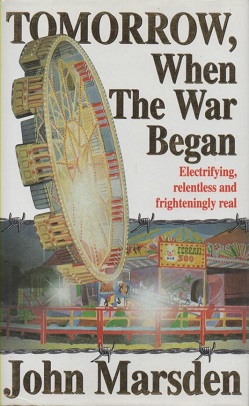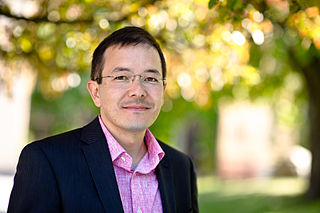Jennifer June Rowe,, is an Australian author. Her crime fiction for adults is published under her own name, while her children's fiction is published under the pseudonyms Emily Rodda and Mary-Anne Dickinson.

The Tomorrow series is a series of seven young adult invasion novels written by Australian writer John Marsden, detailing the invasion and occupation of Australia by a foreign power. The novels are related from the first-person perspective by Ellie Linton, a teenage girl, who is part of a small band of teenagers waging a guerrilla war on the enemy soldiers in the region around their fictional home town of Wirrawee. The name of the series is derived from the title of the first book, Tomorrow, When the War Began.

The Gathering is an allegorical 1993 Australian young adults' novel written by fantasy author Isobelle Carmody. The book was published by Puffin Books Australia in 1993, The Gathering has sold over 70 000 copies in Australia and New Zealand alone. The book was a joint recipient of the 1993 Children's Peace Literature Award and was also named Book of the Year in 1994 by the Children's Book Council of Australia. In 1994, the novel was also integrated into the literature curriculum for the junior years of Secondary Education in the Australian state of Victoria.
Carmelina Marchetta is an Australian writer and teacher. Marchetta is best known as the author of teen novels, Looking for Alibrandi, Saving Francesca and On the Jellicoe Road. She has twice been awarded the CBCA Children's Book of the Year Award: Older Readers, in 1993 and 2004. For Jellicoe Road she won the 2009 Michael L. Printz Award from the American Library Association, recognizing the year's best book for young adults.

Markus Zusak is an Australian writer. He is best known for The Book Thief and The Messenger, two novels that became international bestsellers. He won the Margaret Edwards Award in 2014.

Shaun Tan is an Australian artist, writer and film maker. He won an Academy Award for The Lost Thing, a 2011 animated short film adaptation of the 2000 picture book he wrote and illustrated. He also wrote and illustrated the books The Red Tree (2001) and The Arrival (2006).
Catherine Bateson is an Australian writer.
Margaret Wild is an Australian children's writer.

Craig Silvey is an Australian novelist. Silvey has twice been named one of the Best Young Australian Novelists by The Sydney Morning Herald and has been shortlisted for the International Dublin Literary Award. His 2009 second novel was selected by the American Library Association as Best Fiction for Young Adults in their 2012 list, and was made into the movie Jasper Jones in 2017.
Jack Heath is an Australian writer of fiction for children and adults who is best known for the Danger, Scream, Liars and Timothy Blake series. He has been shortlisted for the ACT Book of the Year Award, CBCA Notable Book Award, Nottinghamshire Brilliant Book Award, the Aurealis Sci-Fi book of the Year, the National Year of Reading "Our Story" Collection, a Young Australians Best Book Award, a Kids Own Australian Literature Award and the Australian of the Year Award. He lives in Gungahlin, Canberra.

William Kostakis is an Australian author and journalist. He is known mainly for young adult fiction, and his 2023 novel We Could Be Something won the 2024 Prime Minister's Literary Award for Young Adult Fiction.

Tomorrow, When the War Began is the first book in the Tomorrow series by John Marsden. It was published in 1993, and is a young adult invasion novel, detailing a high-intensity invasion and occupation of Australia by a foreign power. The novel is told in first person perspective by the main character, a teenage girl named Ellie Linton, who is part of a small band of teenagers waging a guerrilla war on the enemy garrison in their fictional home town of Wirrawee.
The Children's Book of the Year Award: Eve Pownall Award for Information Books was first presented in 1988, when the award was financed by Eve Pownall's family. Since 1993 it has been awarded annually by the Children's Book Council of Australia (CBCA).
The Children's Book of the Year Award: Younger Readers has been presented annually since 1982 by the Children's Book Council of Australia (CBCA). Note: from 1982 to 1986 this award was titled Junior Book of the Year.
The Children's Book of the Year Award: Picture Book has been presented occasionally since 1955 by the Children's Book Council of Australia (CBCA).
The Children's Book of the Year Award: Older Readers has been presented annually since 1946 by the Children's Book Council of Australia (CBCA). Note: from 1946 to 1986 this award was known as "Book of the Year".
Kirsty Murray is an Australian author. Murray writes children's fiction with a focus on Australian history. She is known for the Children of the Wind series of children's novels. She is a recipient of the Aurealis Award for best children's fiction.
Katrina Nannestad is an Australian writer of books for children.





